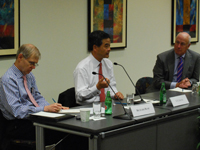Registration
You will receive an email confirming your registration.
IMGXYZ2686IMGZYXSince its return to mainland China in 1997, Hong Kong has gained a reputation as a gateway to China for overseas investment and businesses. C.Y. Leung of the Executive Council of the Hong Kong Special Administrative Region spoke about Hong Kong’s changing role in shaping U.S.-China economic relations. Carnegie’s Douglas Paal and Richard Bush from Brookings Institution moderated.
One Country, Two Systems
Leung discussed the impact of China’s “One Country, Two Systems” policy, which exempts Hong Kong from adopting China’s socialist system and policies for 50 years, on Hong Kong’s role as a bridge between China and the United States.
- A Channel: China’s policy offers a high degree of autonomy for Hong Kong, allowing it to exercise full political rights, such as the right to participate in elections and freedom of expression. This maximizes Hong Kong’s ability to act as a channel between China and the outside world.
- Broader Role: While Hong Kong currently acts as a gateway between China and the West in the financial and economic sectors, it could potentially play a larger role by reaching out to research, media, and educational sectors, Leung said. However, Hong Kong would then face a delicate balancing act in dealing with sensitive issues, since it does not have complete political independence from China.
Hong Kong as a Land of Opportunities
Hong Kong’s physical and political geography places it in a unique position to connect economic interests in China with those in the United States and to assist China in improving its legal infrastructure, Leung said. However, Hong Kong also needs to develop its competitiveness in order to keep its own economy sustainable.
- Higher Education: With an international body of students and faculty in its universities, Hong Kong can leverage its status as a halfway point between the West and the East to attract talent. This enables Hong Kong to make positive contributions to China’s legal system. For example, a joint legal partnership between China and the United States that is designed to train Chinese judges will help increase Chinese recognition of the importance of the rule of law, thereby improving the judicial system.
- Drawing From the Mainland: The large presence of mainland students and returning overseas Chinese likewise attests to the perceived advantage of living and working in a more politically and economically free region. In response, the Hong Kong government has sought to retain talent by providing mainland students with one postgraduate year to seek employment.
- Competitiveness: The rise of Shanghai as a powerful financial center has challenged Hong Kong’s competitiveness as a financial center in the region, Leung said. While Hong Kong’s financial sector may not be sufficient to accommodate all of China’s needs, it still has a comparative advantage compared to Shanghai, due to its solid legal and judicial systems. Moreover, China’s growing economy needs more than one financial center.
- Labor Force: Hong Kong faces a shortage of highly educated labor; the percentage of its labor force with a university diploma is small, at only 19 percent. Hong Kong’s universities must adapt to the new market by training students to serve both local and overseas needs, especially when Hong Kong-based services are growing in popularity in China.
- A Services and Technology Economy: Hong Kong must diversify its economy if it wants to compete with other major cities in China. It can do this by developing high value services, such as training maritime lawyers and training insurance brokers to ensure smooth legal and financial transactions. Improving the quality of its higher education system will facilitate this transition, Leung said. A focus on scientific research and high-technology sectors will likewise allow Hong Kong to increase its competiveness by exporting expertise in pharmacy, biochemistry, and engineering to mainland China.
Future Implications
- Regional Connections: The integration of Hong Kong into the Chinese economy, especially in the region of Guangdong, will continue to deepen with the construction of high-speed trains, as well as Hong Kong’s growing dependence on China for labor, water, and electricity supplies. However, that regional integration must occur without compromising Hong Kong’s autonomy.
- U.S.-Hong Kong: The United States should continue to support Hong Kong by encouraging sustainable economic development and using it as a portal to transfer U.S. expertise and services to China.
- U.S.-China Trade Relations: Leung expressed his belief that an appreciation of renminbi will not help the U.S. economy, since economic tensions between the two countries are much more complicated than a simple currency adjustment. The fundamental issue, he argued, lies in the declining American competitiveness.
